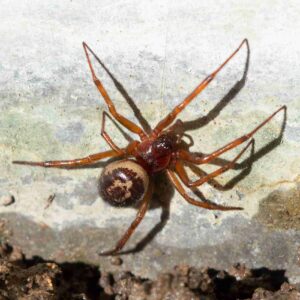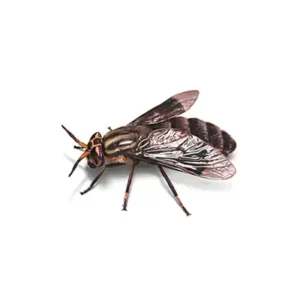Species
Spider Facts
- Species: Spiders are members of a large category of animals called Arthropods or more specifically the Arachnidan class. There are over 3,800 known species of Spiders found in North America today.
- Appearance: Spiders, unlike other insects have eight legs instead of six, no antennae, and only have two body regions instead of three
- Size and Color: Spiders vary greatly in size, shape and color
- Eyes: Spiders have six to eight eyes often arranged in pairs; however, the pattern and placement vary depending on the type of spider.
Spider Behavior
There are thousands of different types, sizes and colors of spiders found all over the world in nearly every type of habitat. Spiders rarely bite humans unless their nests or webs are disturbed. With the exception of a few species, the venom in spider bites is harmless to humans, but some individuals may be hypersensitive and can have a mild to severe allergic reaction when bitten. Spiders feed primarily on other insects, but larger species have been known to feed on small animals such as lizards, birds and millipedes. Spiders in your home can be a sign of a larger pest infestation, and their building of webs indoors can prove to be a nuisance for most homeowners when left untreated. The combination of good sanitation practices and a comprehensive pest control treatment program are necessary to eliminating spiders inside the home.
Spiders have fangs that inject venom in their prey, but usually the venom is harmless to humans when bitten. Spiders are considered predators, they eat other insects, small lizards and baby birds. Spiders do not have chewing mouth parts and rely on digestive enzymes found in their saliva to break down their food. Not all species utilize their webs to trap their prey and some species do not spin webs at all.
Most spiders have a life span of one year, although species such as the Tarantula can live as long as twenty years. The number of offspring spiders produce depends on the species. On average, a female spider can produce 4-300 eggs per sac and can carry up to nine egg sacs a season (breeding cycle). Young spiders, also known as spiderlings, emerge from the egg sac and disperse in a process called ballooning in which they are carried away by the wind after climbing onto nearby objects. This method of dispersal means spiders often can easily recolonize an area where they had previously been eliminated.
Male spiders are often dramatically smaller than their female counterparts. Male spiders are more commonly found in homes as they tend to wander indoors in search of females during mating season. Males are identified by the presence of an enlarged mouthparts (or pulps) that are used to transfer sperm. Although spiders are often feared or considered a nuisance, spiders play a unique role in the biological control of other insects. Spiders found inside the home are often a sign of a larger pest infestation and proper treatment and sanitation methods should be used to ensure control.
Spider Species
4 Seasons Pest Control Options & Pricing
Florida bugs’s 4 Seasons Pest Control will treat your home immediately, then begin quarterly treatments the following month to ensure your home is protected from many household pests.
Enter Info for Pricing
4 Seasons Pest Control

Satisfaction Guarantee
Florida Bug Control will provide treatment to the affected area without any conditions until you are satisfied. 100% Satisfaction Guarantee!
What it includes*
- Ants
- Crickets
- Fleas
- Mice
- All Roaches
- Scorpions
- Spiders
- Ticks
- Wasps
- Other**

Gets rid of pests right now
4 standard services per year
Unlimited callbacks on request
Assessment to prevent pests from coming back
Latest Spider Updates

The Brown Recluse Spider: What You Need to Know

Spring Cleaning: Tips For Preventing Pest Infestations

Mega bugs: Big bugs and big bug problems
Refer a Friend
Get rewarded for referring friends to Name! Receive $25 off your next service when a friend signs up for 4 Seasons Pest Control Service.*
*New service agreements only, not applicable to special services.



